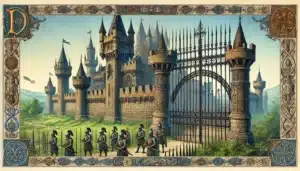At a Glance
- Understanding Your Fencing Needs
- Budgeting for Beauty
- Weathering the Elements: Climate Considerations
- The Iron Fencing Advantage
- Fencing Material FAQs
Choosing the right fencing material is essential in establishing the boundaries of your home, ensuring privacy, and enhancing the aesthetic appeal of your property. The choice of material not only determines your fence’s durability and maintenance requirements but also plays a crucial role in defining the overall look and feel of your outdoor space. This comprehensive guide will walk you through the process of choosing the fencing material that is perfect for your needs.
Understanding Your Fencing Needs
Before diving into the specifics of different fencing materials, it is vital to identify the primary purpose of your fence. The function of your fence largely determines the type of material that would best suit your needs.
Enclosing a Pool
A fence around a pool serves primarily as a safety measure, preventing accidents and ensuring that children or pets cannot access the pool without proper supervision. It is crucial to choose a fence that not only meets safety standards but also complements the overall aesthetics of your outdoor space. The fence should be sturdy, resistant to water damage, and have a lockable gate to provide an extra layer of protection.
Pet Enclosure
If you want to create a safe and secure outdoor space for your beloved pets, it is important to design a fence that effectively prevents them from escaping. Consider the size and climbing ability of your pets when determining the height and material of the fence. For instance, if you have small dogs or cats, a fence with smaller gaps between the panels would be necessary to prevent them from squeezing through. On the other hand, if you have large or energetic dogs, a taller and stronger fence would be required to ensure they cannot jump over or break through it.
Marking Property Lines
Fences are often used to define and mark property lines clearly. When selecting a fence for this purpose, the focus shifts more towards durability and ease of installation rather than specific functions or aesthetics. It is important to choose a fence that can withstand the elements and potential wear and tear over time. Additionally, consider the visibility of the fence and its impact on neighboring properties to maintain good relationships with your neighbors.
Privacy
Privacy fences are designed to provide seclusion and block the view from the outside. If privacy is your main goal, it is recommended to select a taller fence with minimal gaps between the panels. The material chosen for a privacy fence should not only provide sufficient coverage but also blend well with the architectural style of your home. Consider options such as wood, vinyl, or composite materials, which offer a combination of privacy, durability, and visual appeal.
Aesthetics
If enhancing the visual appeal of your property is your primary objective, there are numerous fence materials available that can add a unique touch to your landscape design. From classic wood to modern metal, you can choose a material that complements the style and ambiance of your property.
Additionally, consider incorporating decorative elements such as latticework, ornamental caps, or post finials to enhance the aesthetics of your fence further. Remember, a well-designed and visually pleasing fence can greatly enhance the overall curb appeal of your property.
Learn more: How Wrought Iron Can Dramatically Improve Curb Appeal
Your Property’s Aesthetics And Style
The look of your fence is a significant factor to consider when choosing a material. Whether you opt for the classic elegance of wrought iron, vinyl’s clean simplicity, or wood’s natural appeal, each material provides a distinct aesthetic that can complement your property’s overall look.
Wrought iron fences are associated with strength and sophistication, often used in historical or high-end properties. Conversely, vinyl fencing offers a modern, sleek look that fits well with contemporary homes. Wood, on the other hand, offers a rustic appeal that blends seamlessly with natural landscapes.
The style of your fence should align with both your personal preferences and the requirements of your property. For instance, if privacy is a priority, a solid panel fence made of wood or vinyl might be a suitable choice. On the other hand, if the goal is to enhance curb appeal, a decorative wrought-iron fence could be a perfect option.
Budgeting for Beauty
Your budget plays a vital role in the selection of a fencing material. The cost of fencing systems varies widely based on the material type, design complexity, and installation requirements. For example, wrought iron and aluminum fences tend to be more expensive due to their durability and high-end appeal. In contrast, vinyl and wood fences are generally more affordable, although prices can increase with custom designs and higher-quality materials.
If budget constraints are a concern, consider affordable alternatives like chain link or composite fences. These materials are cost-effective and offer reasonable durability. Alternatively, you can save more for your preferred material by planning your purchase in advance and setting aside funds regularly.
The Trade-Off: Initial Costs Vs. Long-Term Maintenance
Beyond the initial purchase and installation costs, it’s crucial to factor in long-term expenses such as maintenance and potential replacement costs. Some materials, like wrought iron and aluminum, may have higher upfront costs but lower maintenance expenses due to their durability. Conversely, materials like wood may be cheaper initially but require regular maintenance and possible replacement in the long run.
The longevity of your fence significantly depends on the chosen material’s durability and required maintenance. For instance, wrought iron and aluminum fences are highly durable and resistant to environmental damage, requiring minimal upkeep. In contrast, wood fences, while aesthetically pleasing, are susceptible to rot, pests, and weather-related damage, necessitating regular maintenance.
Weathering the Elements: Climate Considerations
The climate and location of your property play a crucial role in determining the most suitable fencing materials. For instance, if you reside in a region characterized by high humidity or frequent rainfall, opting for rust-resistant materials such as aluminum or vinyl would be highly recommended. These materials offer excellent durability and longevity, ensuring that your fence stands strong against the elements.
Conversely, if your property is located in a windy area, it’s important to consider the potential challenges posed by wind resistance. In such cases, opting for a fence design that allows for better wind flow, such as a lattice or chain-link fence, could be a more practical choice. By taking these factors into account, you can ensure that your fencing choice not only enhances the aesthetics of your property but also provides the necessary functionality and longevity for years to come.
Learn more: How to Protect Your Fence From Wind
The Rules and Your Fence
Local building codes play a pivotal role in determining the types of materials you can use for your fence. These codes, established by local authorities, outline the permissible and prohibited materials for fences in specific areas. They may restrict certain materials due to environmental concerns or to maintain a uniform aesthetic within the community.
Furthermore, local building codes usually define the maximum allowable height for fences. While this typically ranges from four to six feet, depending on whether the fence is in the front yard or backyard, there can be variations based on local stipulations. Hence, prior to selecting a fencing material, familiarizing yourself with your area’s specific building codes is crucial.
And if your property falls under the jurisdiction of a Homeowners Association (HOA), you will need to consider their specific standards when choosing your fencing material. HOAs often have stringent rules regarding the type, color, and height of fences to maintain a consistent appearance throughout the neighborhood.
For instance, an HOA might mandate that all fences must be of a particular material and color. Non-compliance with these standards could lead to penalties or the requirement to make modifications at your own expense. Therefore, understanding and adhering to your HOA’s standards is paramount when selecting a fencing material.
The Iron Fencing Advantage
Iron fencing is an exceptional choice for durability, longevity, and aesthetic appeal. Known for its ability to withstand harsh weather conditions, from heavy rains to strong winds, iron fences are remarkably resistant to rot, insects, and fire. This resilience makes them a worthwhile, long-term investment.
In addition to its durability, iron fencing offers a unique aesthetic charm. Its classic, elegant design can significantly enhance the overall appearance of a property. Moreover, iron fences offer a high level of customization. They can be tailored with intricate designs or decorative finials, allowing homeowners to create a fence that mirrors their personal style and complements their home’s architectural design.
Iron fencing is not just about aesthetics and durability; it also excels in providing security and privacy. Its robust construction forms a formidable barrier against potential intruders, offering homeowners an added layer of protection. Furthermore, by opting for taller iron fences or adding privacy screens, you can create a secluded outdoor space, safe from prying eyes.
Why Choose Irish Iron?
Irish Iron is the premier choice when selecting a reliable and professional iron fence installer in Sacramento and the surrounding areas. This distinction is not by chance but a result of our unwavering commitment to quality, craftsmanship, and customer satisfaction.
Irish Iron has a proven track record, backed by a multitude of positive customer testimonials and high ratings on review platforms. Our team of skilled professionals brings with them years of experience and utmost dedication to each project they undertake.
Moreover, Irish Iron offers a range of designs, from the classic to the contemporary, ensuring that every client’s aesthetic preferences are catered to. We understand that a fence is more than just a barrier; it is a statement of style and a reflection of your home’s personality.
Our use of high-quality materials sets Irish Iron apart. We believe in providing our customers with fences that are not just visually appealing, but also durable and long-lasting.
With a clear focus on customer service, Irish Iron goes the extra mile to ensure a seamless installation process, minimizing disruption to your routine and maintaining utmost respect for your property.
In conclusion, selecting the right fencing material is a crucial decision, impacting your property’s appearance, security, and maintenance. Iron fencing offers an ideal combination of durability, aesthetic appeal, and security, making it a smart investment for any homeowner. And with Irish Iron as your trusted partner in fence installation, you can rest assured that you will receive exceptional quality and service every step of the way. So why wait? Contact us today to schedule a consultation and take the first step towards enhancing your property with an exquisite iron fence from Irish Iron!
Fencing Material FAQs
What are the different types of fencing materials available?
There are several types of fencing materials including cedar, vinyl, composite, redwood, teak, metal, treated wood, and more.
Which fencing material requires the least maintenance?
PVC and vinyl fencing are low-maintenance options that typically need only occasional cleaning.
How does property line affect fencing?
It’s essential to know your property line before installing a fence to avoid disputes with neighbors and legal issues.
Does the choice of fencing material affect home value?
Yes, the right fencing material can enhance curb appeal and potentially increase home value.
Which fencing material is best for security?
For security, materials that are sturdy and difficult to breach, such as metal or composite, are often preferred.
Can I install a fence myself?
While some people choose to DIY, hiring a professional is usually recommended for best results and adherence to local regulations.
How long do fences typically last?
The lifespan of a fence depends on the material.
What is the best fencing material for pets?
The best fencing material for pets depends on the type of pet, but options include chain link for its visibility and durability, and vinyl for its smooth surface and lack of splinters.
How reliable are automatic door locks?
Vinyl, metal, and composite materials typically perform well in harsh climates.
Can I mix and match fencing materials?
Yes, some homeowners mix and match fencing materials for aesthetic or functional reasons. However, it’s important to check with your HOA for any restrictions.



